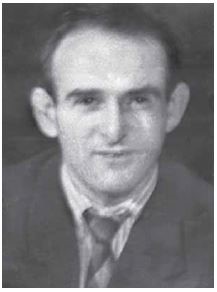
Emil Fradkin
Emil Fradkin was born in Moscow in 1921. His family later moved to Uzbekistan in Central Asia, where Emil’s father lectured at several teachers' colleges. In the mid-1930s the family moved to Leningrad (now St. Petersburg), where Emil studied at a Yiddish school. He finished a 10-year school, which was not a very frequent achievement at that time and, therefore, in October 1940, after being drafted, he was assigned to duty with the communication troops, who were considered to require people who had an above average intelligence.
With the beginning of Operation Barbarossa in June 1941, Fradkin served with the Separate [Guarding] Battalion of the Institute for Communications and Secret Technology, which was located in the vicinity of Moscow. Such a type of service was undoubtedly a relatively safe post in wartime, but this service came to an end in 1943. Fradkin was then sent to a school for subaltern officers in the infantry (the studies at this school were so intensive that they slept [only] four hours a day, Fradkin recalled after the war). Upon graduation from the course, Emil was promoted to the rank of second lieutenant and assigned to be a platoon commander on the 1st Ukrainian Front. In the fall of 1943 he took part in the Red Army's attempt to force the Dnieper River near Velikii Bukrin (at the so-called Bukrin bridgehead), one of the most bloody operations of the war. He recalled that he crossed the Dnieper River on a wooden door that he had torn off an abandoned peasant house. On the western bank of Dnieper, during an infantry attack of his platoon, he was wounded in the chest. Fradkin's first injury was more severe than the second one, more than half a year later. When the Soviet attack had failed, Fradkin realized that he was in enemy territory and might well be captured by the Germans. If so, as a Jew he would be killed immediately. A fellow soldier kept him from committing suicide, shouting "Second Lieutenant, what are you doing?" and grabbing Emil's hand, which was holding a pistol to his temple. When the Soviets launched a second, this time successful, attack Fradkin was removed from the battlefield. Later, in hospital, he understood only one phrase that was pronounced by his doctor: "A lethal end is probable." However, Fradkin survived, although he lost part of one of his lungs.
After being released from the hospital, Fradkin was sent to the 3rd Belorussian Front, where he was assigned to be part of the "tank drops," units of infantry soldiers who rode into an attack on tanks and then dismounted to fight on foot in the final phase of the assault. The chances of surviving such an operation were minimal. With his regiment, Fradkin participated in Operation Bagration, by which the Soviets recaptured Belorussia. He was wounded seriously in the right hand near Pohost, in Polesia in the summer of 1944 and could no longer fire a rifle. Consequently, after he left the hospital, he was released from the Red Army.
Fradkin was awarded the medal For the Victory over Fascist Germany and the Order of the Red Star.
In the fall of 1944 Emil Fradkin enrolled in the faculty of history of the Leningrad University. He recalled that during the first months of his studies, he often fell asleep during lectures and seminars. As when he had been an infantryman, he could not avoid sleeping while he was sitting rather than marching ahead with his kitbag and weapons or digging a trench. Other former frontline soldiers behaved similarly in the classroom.
Both during the war and after, Fradkin was easily identified by non-Jews as a Jew – both because of his name and because of his classic "Semitic" appearance. He stated that he encountered antisemitism on the frontlines only once.1 However, during the Stalinist anti-Jewish campaign of the late 1940s he suffered a serious antisemitic insult. When he was studying at the university, the idealistic young Fradkin applied to join the Communist Party. The head of the commission looked at his autobiography and said: “Fradkin, were you indeed wounded in the chest? Or, rather, in the back, I suppose.” This was a rude allusion to the cliché that the Jews used to run away from the battlefield and, thus, could be wounded only in the back. Upon hearing this, Fradkin's first impulse was to pick up a heavy paperweight from the desk and to throw it at the head of the commission. He refrained from doing so but never again applied to join the Party and never regretted being identified as "a non-Party member."
After the war Fradkin was an archeologist who specialized in the Upper Paleolithic period. He died in Leningrad, in 1984 of lung cancer. He could not be operated on since he had only one healthy lung after his first war injury.
[Based on the drafts of memoirs that Emil Fradkin left behind after his death, as well as on conversations with him.]
- 1. In various conversations Fradkin cited the insulting words of a staff major in different ways; it makes no sense to quote them here. He noted that this major later became his friend.






